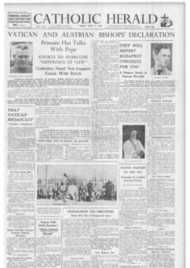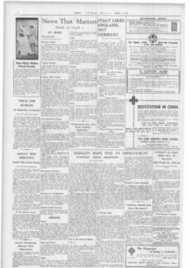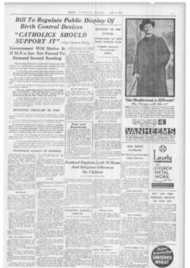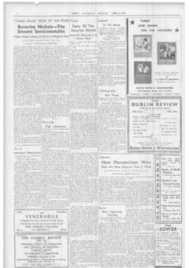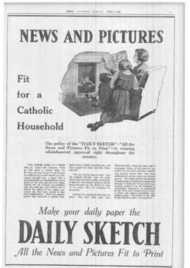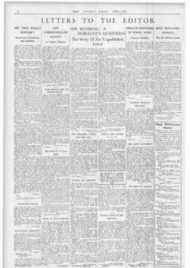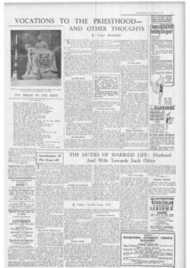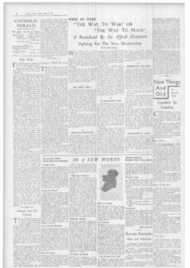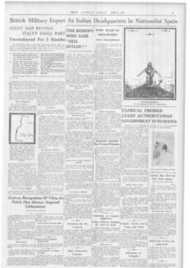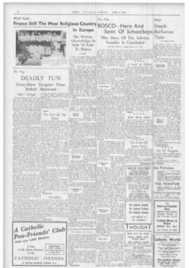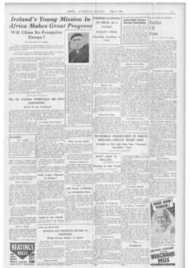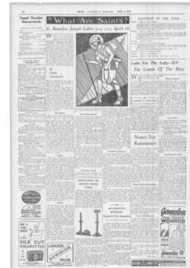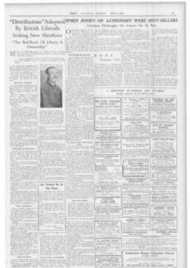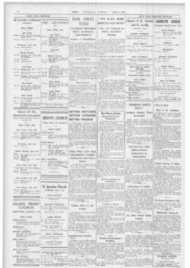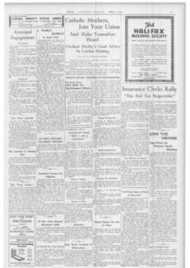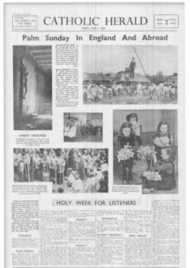Page 3, 8th April 1938
Page 3
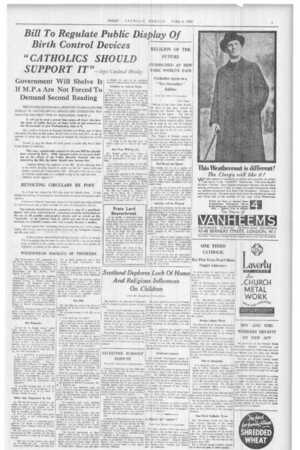
Report an error
Noticed an error on this page?If you've noticed an error in this article please click here to report it.
Tags
Share
Related articles
That Old Chestnut Again
How The World Saw Birth Control Ruling
Vatican Rebuts Un Birth Control Claim
This Article Is The First Of Two By United Press
Tony Blair Has Led Britain Into An 'ethical Abyss', Says...
Communist Propaganda In Ireland
Bill To Regulate Public Display Of irth Control Devices "CATHOLICS SHOULD
SUPPORT IT —Says Cardinal Hinsley
Government Will Shelve It If M.P.s Are Not Forced To Demand Second Reading
THE CONTRACEPTIVES BILL, DESIGNED TO REGULATE THE DISPLAY OF CONTRACEPTIVE DEVICES AND LITERATURE, WAS READ FOR THE FIRST TIME ON WEDNESDAY, MARCH 30.
It will not be read a second time unless all those who have the cause of public decency at heart write to put pressure on the Government to give Parliamentary time to it. • The 3 million Catholics in England, Scotland and Wales, and all others who think with them on this matter, should write to their local M.P., or stir up societies of which they may be members, to demand the consideration of this Bill.
Already in 1934 the House of Lords passed a similar Bill, hut it failed in the House of Commons.
This year, considerable support for the new Bill has already been evinced by M.P.a. With energetic action on our part, backing up the efforts of the Public Morality Council, who are sponsoring the Bill, the latter should soon become law.
Cardinal Ilinsley has approved of the Bill. In the following letter to the Public Morality Council he points out that he " agrees with your attitude towards the Contraceptives Bill. Although it does not go so far as Catholics would wish, it is certainly a step in the right direction . . . Catholics' should support it."
REVOLTING CIRCULARS BY POST
In at least one respect the Bill falls short of Catholic ideas. It only forbids the sending of contraceptive advertisements to unmarried persons under eighteen.
It is known, however, that many young married couples are being pestered by advertisements sent to them through the post, of contraceptive devices.
The Catholic Herald has in its possession a copy of a peculiarly blatant and gross advertisement, containing complete instructions on the use of all possible contraceptive devices and an attack on the " obscenity " of the Catholic Chur ch, which was sent in an unsealed envelope, to a Catholic woman who had recently become a mother.
A protest against this " intolerable insult and impertinence," as this woman rightly calls it, has been sent to the Home Secretary, the Postmaster General, and the local My.
„.. . Isolated protests, however legitimate and forceful, will not be enough. The Government must be made to realise that Catholics, and an increasing body of opinion in the country, intend to make a firm stand against the organised corruption of the nation's morals.
WIDESPREAD BACKING OF THINKERS
The Contraceptives Bill, sponsored by the Public Morality Council, is supported by Cardinal Hinsley, Archbishop of Westminster, Mgr. Downey, Archbishop of Liverpool, Mgr. Williams, Archbishop of Birmingham, and Mgr. Mostyn, Archbishop of Cardiff.
It is also supported by the Anglican Archbishops of Canteibury and York; the National Council of Women Southport Conference; 192 Religious, Social and Educational Organisations; the Jewish community: various Free Church organisations; a large number of responsible and distinguished workers in political, social, educational, and medical spheres. including Lord FitzAlan, Sir Charles Grant Robertson (Vice-Chancellor of Birmingham University), and Dr. William Brown (Wilde Reader in Mental Philosophy, University of Oxford).
The Public Morality Council (37, Norfolk Street, Strand, London, W.C.2) has published two pamphlets which give ample evidence of the necessity for the Bill. One example will suffice here.
One Example In one of the largest towns," states Lord Dawson of Penn, " outside a chemist's shop which faces the exit of one of the largest factories in the town, where not ooly men but boys pour out when the work hours are over these machines stand in front of them. On the left side of the machine there are divisions out of which are sold, for 6d. in the sloe aspros and cough lozenges, and on the other side, for Is., are sold contraceptives.
" It is impossible to justify anything of that kind. . . . It is unreasonable to suggest that if you suppress it you are thereby curtailing liberty. . . . There is an undoubted tendency for shops which are lurid in their get-up to increase, and there is increased glamour in their presentment. Inside their windows contraceptives are on view. But side by side with those contraceptives, in many instances, you will find illustrations and descriptions which are flamboyant and aggressive.
" If this Bill becomes law, it will be illegal to display any contraceptive in or outside any shop so as to be visible to persons outside the shop. . ."
What Has Happened So Far
In 1909 the Government of the day admitted the justice of the proposal then made on behalf of the Council for the promotion of Public Morality, and undertook to introduce legislation.
in 1916 and 1920 attempts were made to give effect to this undertaking, but without success.
In 1934, as a result of continued public agitation, the House of Lords adopted a Measure almost identical with the present proposals.
On that occasion Lord Dawson of Penn, introducing the Bill, revealed that the sale of contraceptives is going up by leaps and bounds.
" One firm at the present time turns out 84 million per year. Another firm turns out 72,000 per week, and that is a firm of home production: and is reinforced by large importations from abroad . . ."
The Bill was supported in the House of Lords (which approved of it) by the Archbishop of Canterbury, the Bishop of London, Lord FitzAlan, Lord Iddesleigh, and others.
In October. 1936, the agitation culminated in a formal request by the Public Morality Council to the then Home Secretary to receive a representative deputation to ask for facilities for a discussion in the House of Commons. The request quoted the large measure of national support accorded to the present Bill.
The Bill
The new Bill was read in the House of Commons for the first time on Wednesday March 30.
The principal clauses of the Bill are as follows:
I. (1) It shall not be lawful—
(a) to send or deliver, or cause to be sent or delivered, for the purpose of any trade or business, to any unmarried person who has not attained the age of eighteen years, any circular or advertisement relating to any contraceptive: (b) to sell, hawk, or offer for sale in any street or public place, or by means of an automatic machine, so placed that it can be used by persons in any street or public place, any contraceptive: (c) to display in, upon, or outside any shop so as to be visible to persons outside the shop, any contraceptive or any box, bottle, or wrapper containing. or purporting to contain, any contraceptive, or to display in, upon, or outside arty shop so as to be visible as aforesaid, any picture or written description of any contraceptive, or any illuminated or other sign advertising contraceptives.
With the exception of prohibiting the exhibition of the contraceptives themselves in shops, the Bill is similar to that passed by the House of Lords in 1934.
Introducing the Bill last Wednesday, Mr. R. J. Russell said:
" I think all hon. Members must be aware of the development which has taken place throughout the country, and very largely in Metropolitan areas, of publicity with regard to contraceptives and their display and sale . . .
In inquiring how many chemists supplied these articles I found that of 280 shops only seven did not stock and distribute contraceptives.
" In addition to this business. there has grown up a very large number of shops which deal in contraceptives only. and deal in them in such a way as to become an offence to a very large portion of the population. In one district alone I found there were 36 of these stores, apart from the chemists' shops.
" The general appearance of these shops is well known. If you look into their windows you find certain literature and pictures which are liable to inflame desire. and joined thereto there will be other literature which will tell you how to satisfy desire without risk, and these is offered for sale all the necessary materials and products that are required.
Country as well as Town
" That is very largely the position which is to be found in our larger centres of population. But I am sorry to say that the country districts are now becoming infiltrated with the sante thing, and in almost every village there is to be found someone acting as a tout for the display and sale of these articles.
" It is for the purpose of stopping undue display that this Bill is presented.
" Let me give one illustration of what I mean. A young boy was going along a country lane in a very remote district of this country. As he went along a motor car drew up by his side. He was handed a small packet, and in that packet there was everything that was required for the purpose which was described therein, and in addition there were complete instructions and complete information as to where he could get supplies.
" It seems to me that that state of affairs ought not to exist in this country."
But They Will Go On
Mr. Russell added that " there is nothing in the Bill which will stop the sale of contraceptives to those who need them . . . "
It is doubtless this aspect of the Bill which prompts Cardinal Hinsley to state that it "does not go as far as Catholics would wish."
The Bill was opposed by Mr. Thurtle on the ground that if there is a case for . dealing with really offensive advertisements, or offensive exposure of goods, I would certainly support such legislation, but I contend that the Home Office is the proper Department to sponsor such legislation."
The Bill was backed by Viscountess Astor, Sir G. Hume, Sir J. Haslam, Sir P. Hannon, Dr. Salter, Dr. Howitt, Sir I-. Freemantle, Sir J. Leech. Sir H. Morris Jones, R. J. Russell. and Mr. Magnay.
blog comments powered by Disqus


